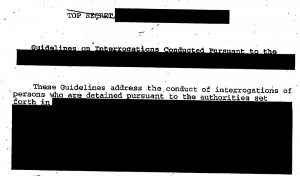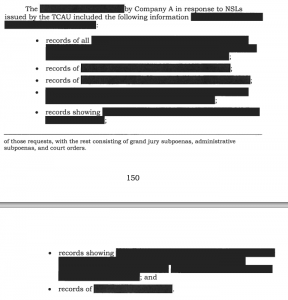
Almost 3 years ago, I discovered that the judge in the ACLU torture FOIA, Alvin Hellerstein (who recently ordered the Administration to release images from torture), was trying to force the Administration to declassify a phrase making it clear torture had been authorized by the September 17, 2001 “Gloves Come Off” Memorandum of Notification. The phrase appeared on a January 28, 2003 Guidelines on Interrogation document signed by George Tenet (this post describes what great CYA including the phrase was).
In my reporting on it, I noted that National Security Advisor James Jones had secretly written a declaration in the suit arguing the phrase couldn’t be released. And I also noted that CIA’s own declarations conflicted about who had made torture a Special Access Program, CIA or the National Security Council.
Ultimately, however, the 2nd Circuit — in an opinion written by Judge Richard Wesley — reversed Hellerstein and permitted the Administration to keep that short phrase secret (though the Administration permitted that detail to be declassified for the Torture Report).
These issues have resurfaced in a related FOIA suit being reviewed by the 2nd Circuit (including Wesley and Judges Reena Raggi and Gerard Lynch).
Back in late 2012, Main Street Legal Services FOIAed the NSC for records on drone killing (including minutes of NSC meetings in 2011). The government refused to respond, arguing NSC is not an Agency subject to FOIA. So Main Street asked for discovery that might help it show that NSC is an Agency. It lost that argument with District Judge Eric Vitaliano, and this Appeal focuses on the issue of whether NSC is an Agency for purposes of FOIA or not.
In addition to pointing to statutory and historical reasons why NSC is an Agency, the appeal also points to things — including torture, but also including things like cybersecurity, crafting Benghazi talking points, and drone-killing — that were run out of NSC. The government, in response, argued that the President was very closely involved in NSC and presided over the Principals Committee, meaning NSC was too proximate to the President to be subject to FOIA. The response also keeps insisting that NSC is an advisory body, not anything that can make decisions without the President.
That back and forth took place in the first half of 2014.
Then, the Torture Report Summary got released, showing that CIA records indicate President Bush was not briefed on torture until 2006 but that NSC figures — Alberto Gonzales and Condi Rice, among others — told CIA torture was authorized. Main Street wrote a letter in February pointing to the evidence that the President was not in the loop and that NSC authorized torture.
The SSCI Report found that NSC committees, on which the President does not sit, debated, authorized, and directed CIA to apply specific interrogation techniques to specific detainees. In 2004, for example, CIA “sought special approval from the National Security Council Principals Committee” to use “enhanced interrogation techniques” on detainee Janat Gul. Thereafter, NSC principals met and “agreed that ‘[g]iven the current threat and risk of delay, CIA was authorized and directed to utilize” the techniques on Mr. Gul.
The question of who authorized torture thus became a central issue at the oral argument in this suit on March 2 (this discussion starts after 34:00). After Raggi raised this issue, Wesley went on with some urgency about the possibility that someone started torturing without the input of the President.
Judge Wesley: Are you saying then that anything the CIA did in terms of enhanced interrogation techniques clearly, was clearly a Presidential directive?
NSC Counsel Jaynie Lilley: No, your honor —
Wesley: Well then, well if that’s not the case, its a very curious position for you to take because some of these bear heavy burdens. Some of these assertions that you’re making that the President is at the end of all these decision chains bear heavy burdens and I don’t quite understand it. Congress said sole duty is to advise and assist the President. If someone else decides to use enhanced interrogation techniques and we decide that this is done by the group, solely by the advisor, assistant to the President, then it’s the President’s decision is it not? Did the decision flow through the NSC?
Lilley: Your Honor, many decisions–
Wesley: Would it, structurally, I’ll it easier, would it structurally have flowed through the NSC as it’s currently structure pursuant to presidential order and an act of Congress, would a decision to conduct enhanced interrogation techniques have flowed through the NSC up to the President. Pursuant to the way it’s structured now.
Lilley: Your Honor, let me be sure I’m answering the question that your asking. There are decisions that are made on matters of national security policy that come through the various–
Wesley: Pursuant to law and the structure of the NSC who had the authority? Did only one person have the authority to order enhanced interrogations techniques?
Lilley: Your Honor, –
Wesley [voice is rising]: Yes or no?!
Lilley: I cannot speak to individual decisions –
Wesley: Well, if you can’t tell me, then you’re telling me that then the President perhaps didn’t make that decision. And then you’re telling me that someone else did. And if someone else did, then I begin to have a problem. Because I have a hard time understanding how their sole function is to advise or assist the President if suddenly they decide, independent of any Presidential approval, that they can torture someone!
Lilley: Your Honor–
Wesley: It’s very simple Counselor, and I’ve been troubled by the government’s position on this throughout. I’ve been troubled — for twenty years the Office of Legal Counsel said that this was an Agency. And then suddenly in a letter, in 1994, for some reason the Agency flips. We have in the legislative record, we have the committee notes from the two committees, and what is one of the entities that’s listed when they decided to include the Executive office, what is one of the Agencies that Congress lists, one of the groups that Congress lists as an Agency? The NSC. Who created the NSC? The President didn’t. An act of Congress did. An Act of Congress creates two of the Subcommittees. A very curious advisor forced on the President — it sounds like a Separation of Powers issue to me. But, tell me. And then I won’t ask again. And if you don’t want to answer my question don’t answer.
Pursuant to the way the it is currently structured if in your view the NSC is solely an advisory authority, who had the authority to order enhanced interrogation techniques? Who?
Lilley: In any matter of national security policy, there are two places where decisions can be made. One by the President and one by that Agency with the statutory authority to take the act.
Wesley: So you’re telling me that the CIA had the authority to do that?
[snip]
Wesley: The Director of the CIA could have done this independent of the President’s directive?
Lilley: Your Honor, I cannot speak to that.
Wesley: But for purposes of this discussion you’re saying ‘not someone in the NSC’?
Lilley: The NSC could not — does not direct any individual Agency to take individual actions.
Wesley went onto to describe the plight of the CIA that might not want to do something (torture) it has been ordered to do by the NSC, “it’s on him, legally, not on the NSC.” “Yes, your Honor,” Lilley agreed.
While Wesley didn’t say so, that is, precisely, what Tenet argued when he noted Torture was done pursuant to Presidential order on his 2003 Interrogation document, dodging responsibility for torture. But if Lilley’s claim is correct, then CIA bears all the legal responsibility for torture.
At the end of the hearing, Wesley asked Lilley whether they intend to respond to Main Street’s letter. When Lilley said no, Wesley and Raggi specifically instructed Lilley to respond, noting actual page numbers.
In its response on March 16, the government — some members of which have been arguing for months that the NSC approved torture at every step of the process — newly asserted (ignoring the references that show Bush was never briefed until 2006) that George Tenet was only getting NSC’s advice; he was not being ordered or authorized by them.
Another cites a CIA official’s notes indicating that the Principals Committee “agreed” that CIA was “authorized and directed” to engage in certain activity, confirming the CIA had such authority, and that the then-Attorney General approved the resulting action. See id. at 345. These references confirm that the NSC functions in accordance with the advice and assistance role assigned to it by statute and by the President (currently in Presidential Policy Directive-1) as an interagency forum for coordination and exercises no independent decisional authority. The authority for the underlying decisions rested with the relevant heads of departments and agencies or the President himself.
Remember, DOJ has been claiming it never opened this document. Has it now done so?
But the SSCI evidence that Bush was never briefed is a point Main Street made in a letter last night.
Defendant still fails to explain who authorized the torture if not NSC, as CIA’s own records describe, especially given that CIA did not brief the President until years later.
A great deal of documentation shows that “NSC” (or rather, Dick Cheney and David Addington) authorized torture. But the NSC is trying to sustain the unsustainable position that a Memorandum of Notification not listing torture authorized torture, that Bush never got briefed on torture, and that all those meetings at which NSC members (and Dick Cheney) authorized torture didn’t amount to authorizing torture.
Because if it admitted the truth — that NSC or the Vice President authorized torture without any review by the President — then it would make all these documents, the 9000 documents President Obama got CIA to successfully hide, subject to FOIA.
And then we’d really start having some fun.
Update: I’ve added some to my transcription from the hearing and some additional analysis.


